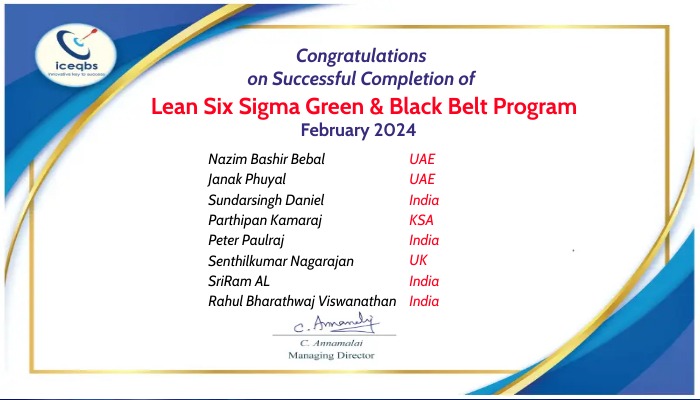Lean Six sigma Green Belt in Bengaluru

Lean Six sigma Green Belt in Bengaluru Lean Six Sigma Green Belt is a methodology that combines the principles of Lean Manufacturing and Six Sigma to eliminate waste, reduce defects, and improve the efficiency of processes. Individuals trained and certified as Lean Six Sigma Green Belts play a crucial role in driving process improvement initiatives within organizations. Let’s delve into the key aspects of Lean Six Sigma Green Belt and its significance in the business world.
Firstly, a Lean Six Sigma Green Belt possesses a solid understanding of the core concepts of both Lean and Six Sigma methodologies. They are proficient in various tools and techniques used for process improvement, such as DMAIC (Define, Measure, Analyze, Improve, Control), value stream mapping, root cause analysis, statistical analysis, and more. This comprehensive knowledge equips them to identify inefficiencies, defects, and bottlenecks in processes and devise effective solutions to address them.
One of the primary responsibilities of a Lean Six Sigma Green Belt is to lead process improvement projects within their respective areas or departments. They work closely with cross-functional teams to define project goals, collect and analyze data, identify root causes of problems, and implement solutions to enhance process performance. By leveraging their expertise in Lean and Six Sigma methodologies, Green Belts facilitate the implementation of sustainable process improvements that result in cost savings, increased productivity, and higher customer satisfaction.
Furthermore, Lean Six Sigma Green Belts serve as change agents within their organizations. They promote a culture of continuous improvement by advocating for the adoption of Lean Six Sigma principles and practices across all levels of the organization. Through training sessions, workshops, and knowledge sharing initiatives, Green Belts empower employees to actively participate in process improvement efforts and contribute to achieving organizational goals.
Another key role of Lean Six Sigma Green Belts is to support Black Belts and Master Black Belts in larger-scale improvement projects. They assist in data collection, analysis, and implementation of improvement strategies under the guidance of more experienced practitioners. This collaborative approach ensures the success of complex improvement initiatives and helps build a pipeline of skilled Lean Six Sigma professionals within the organization.
In addition to project leadership and support, Lean Six Sigma Green Belts play a vital role in sustaining process improvements over time. They develop and implement control plans to monitor key process metrics and ensure that performance gains are maintained post-implementation. By establishing robust monitoring mechanisms and conducting periodic reviews, Green Belts prevent regression to previous performance levels and drive continuous enhancements in process efficiency and effectiveness.
In conclusion, Lean Six Sigma Green Belts are instrumental in driving process improvement and organizational excellence. Their comprehensive knowledge of Lean and Six Sigma methodologies, coupled with their project management skills and change management capabilities, enables them to lead successful improvement initiatives that deliver tangible business results. By fostering a culture of continuous improvement and leveraging data-driven approaches, Lean Six Sigma Green Belts contribute significantly to the competitiveness and success of their organizations in today’s dynamic business environment.

